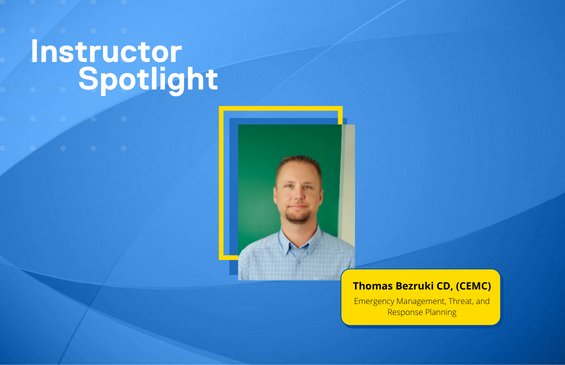Why the Demand for Emergency Management Has Risen

May 4, 2022
The need for emergency management has always been prevalent, but especially so since the pandemic. To learn more about this increasingly in-demand field, we spoke to Thomas Bezruki CD. (CEMC), instructor and program developer for our Certificate in Emergency Management, Threat, and Response Planning.
The Chang School: What kind of solution can emergency management provide to an organization/individual?
Thomas Bezruki: The COVID-19 Pandemic has put the field of emergency management on the map together with the importance of Preparedness, Prevention, Mitigation, Response and Recovery planning, both in the public and private sectors.
Prior to the pandemic, emergency management was not always a top priority for many organizations, yet now extreme emphasis in this area has come to light. Professionals in the field of emergency management are now in high demand and will continue to be in high demand as we slowly enter the recovery phase of the pandemic.
Emergency management and response plans are now proving their importance not only through business impact mitigation strategies, but further with public safety as a whole. Professionals that are trained in emergency management practices and operations can not only dramatically assist in response to emergency incidents (e.g. COVID-19), but can also assist in the coordination of responses and recovery efforts.
CS: Is there a memory or moment that your interest in emergency management began for you?
TB: Planning for operations and emergency situations has always been a part of my interest, stemming from my time serving with the Canadian Armed Forces (DND) overseas.
During that time, I had the opportunity to work under a Colonel who was already in the field. His leadership and ability to view things through different lenses and with greater detail, aided my decision to enter this profession. Public safety was already within my interest areas, however upon further investigation into this profession I became passionate about the field of emergency management.
CS: Since your career in emergency management, can you describe a stand-out moment that made you proud of yourself or reinforced your belief in what you are doing?
TB: Since the onset of the pandemic my career has had many successes. Having the opportunity to work with public and private organizations has given me the opportunity to use the tools/experiences that I have been equipped with, through numerous areas of studies and experiences within the field.
Setup and operations of Mass Immunization Centres, Emergency Response Plans (numerous organizations and agencies), and feedback from community members solidified my success and continual passion for the field.
CS: As a program developer, what do you hope your learners take away from a single course and the program as a whole?
TB: As the program developer, there are many things that need to be taken into consideration when designing a program. Historical information/data, theoretical understanding, and scientific analysis may not be the most interesting portions for some in the field, but having the foundation and understanding of these areas is paramount to the creation of a competent emergency management professional.
The utilization of past experiences from those taking the program are equally as important, as continual improvement from personal experiences have many benefits for not only the learners but from the program’s perspective. We use first-hand experiences and lessons to equip our students, with the intention of creating a tool box for the next professionals in the field.
Should a participant in the program like to focus on a specific agency or specialized area (e.g. Policing-Protests) we allow them to do so and provide them with the resources and support that they require to improve their portfolios and areas of interests.
CS: Is there anything that surprises you about the learners you come into contact with? Or is there anything your learners are surprised about when completing the certificate?
TB: The program has students from numerous backgrounds and experiences. Regardless if you are just starting or pursuing a career in the field, or are an experienced professional, we always learn from one another.
One of the best parts about being an instructor in this program is the ongoing learning experience we gain from our students themselves. Class discussion boards and virtual discussions are one of the most enjoyable portions of the program, as discussions arise where we can interact and engage with one another through different viewpoints and experiences.
CS: What is one piece of advice you would give yourself at the beginning of your career?
TB: Do not get frustrated or be afraid to get into this profession. You cannot become complacent in this field, you must commit to becoming adaptable, a continuous learner, and remember that you need to learn from experiences.
CS: Finally, is there anything that wasn’t mentioned that you’d like to add? Personal or in relation to the program?
TB: This field is extremely large with many areas that it can take you. Whether you are thinking of going into public or private organizations/agencies there are so many areas that you can specialize in. Once you find your niche, be a ground breaker and share your experiences and lessons learned. As a profession we can improve one another by sharing what has worked, what did not work, and what can be improved upon next time.
We can improve the overall landscape of public and organization prevention, preparedness, and response and recovery, across the field of emergency management. Further, take the time to interact and speak with everyone involved in a response (e.g. janitorial services/procurement services), as you will better understand the complexities of each area during an incident. The things you can learn from speaking to others will pay dividends in future responses.
